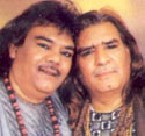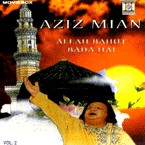Adil Najam
This post was originally posted on October 19, 2006. It is being reposted with the addition of some new Qawali video clips.


As I was driving back from work tonight, I had an old Sabri Brothers cassette playing in my car. The window was down, the sound was loud. As I stopped at a red light, my head still nodding to the rhythms, I noticed that the American woman in the car parked next to me was staring at me with a rather perplexed look (Bostonians don’t often get to hear the Sabri bradraan!). She shouted over the music to ask me what type of music this was and from where. I smiled and told her. I am not sure if she heard what I said over the noise because the light turned green just then and we went our different ways.
I guess she left wondering what the beat and sound was about. I left wondering what has happening to qawalli in Pakistan today? Who are the big names out there? Are there any? Is there any Ghulam Farid Sabri, Aziz Mian, Nusrat Fateh Ali equivalent out there? I know of Rahat Fateh Ali Khan, but he seems to be mostly re-rendering Nusrat Fateh Ali Khan’s work. Who else?
I was a qawalli fan while I was still in school; long before there was a Nusrat Fateh Ali Khan and long before it was kool to be a qawalli fan. I don’t know why I was a fan; no one else around me was. I guess the beat was enticing, the stories interesting, and the qawals colorful. I suspect that those around me thought it was rather odd that I liked qawalli so much; but then, people around me have always considered me odd!
This was the era when the Sabri Brothers Qawall and Aziz Mian Qawall were at the peak of their prowess. They were both major innovators of the qawalli genre. Many purists consider them blasphemous not just because they moved qawalli from being predominantly religious – devotional to everyday-mundane. Remember, the ‘Paani ki qawalli’ and ‘Paisay ki qawalli’ (both by the Sabris) and the populist poetry extravaganzas of Aziz Mian (which often were more Munni Begum than Aziz Mian).
I guess I like qawalli for the same reason I like Johnny Cash and Waris Shah. They all have great stories to tell. And what could be more enticing than a good beat combined with a good story!
I found this video clip of this Sabri Brothers Qawall rendition of an old devotional qawalli. It is not the best recording but it is one of their most popular religious qawallis. And this being Ramzan – yes, I am sticking to Ramzan with a ‘Z’ – it is timely because it used to be a staple of the Sehri transmissions on PTV. Enjoy!
And while we are at it here is a clip of a classical Aziz Mian performance:




















































Dear Naseem the same freedom is for you to have your beliefs and practice them. Being against freedom of thought is what leads to ignorance. I’ve known a lot of people finding religon under the exact same umbrella of freedom that you define of a foreign university. When there is freedom you are free to pray all day and all night, you are free to read the Quran instead of this comment or this article (which you chose to do out of your own free will). Judge not people other than yourself.
Sorry Naseem, love and freedom have always been positives in my perception and always will be. And I will fight to the death for both these things.
I think any attempt of yours to say that religion prohibits the exercise of love and freedom is a profound misunderstanding of religious purpose. Religion, including Islam, should help people, not enslave them.
There is no culture on the face of the earth which does not enjoy musical expression, if not a well developed musical tradition. All cultures have invented different kinds of instruments. Music is a human universal. To say that Islam should stifle this is simply perverse.
My favorite qawwali singer, just to toss my hat in the ring, is Abida Parween, who I’ve had the honor of seeing live in Karachi–I’ll never forget it.
Assalamau Laikum,
Muslims are aware that nothing has been prohibited by Allah SWT except that which is harmful to the welfare of a Muslim individual and the society as a whole. The divine attribute behind the prohibition of music can be comprehended by looking into the diverse influence music can have.
Today, individuals are being confronted by a situation where one is forced to listen to music whether by choice or without. Music is played in nearly all department stores and super markets. Even whilst walking in the streets, we find cars blaring with music. No matter which direction we go, we are blasted with music. The increasing popularity of music, which is prevalent in our society poses a tremendous danger for muslims.
It is a very ignorant and misguided attitude to percieve music as a form of pleasure and passing of time, since the messages of today`s music follow a general theme of love, fornication, drugs and freedom.
We find that the whole world is obsessed with the kufr idea of freedom, i.e. freedom of speech, freedom of movement, etc.
In modern schools and universities, we observe independence, free expression and secular thinking being encouraged. This idea of freedom,
Brenda,
Salaam to you
Nusrat was trying to manage his vocal drawback which was his voice’s aiguity, high octave and a very thin tenor, his urdu pronunciation was certinly with punjabi accent,
But excellent
technique, controle and rythm. So in the west something new, is always attractive, In 2004 I had organised with an Association, the concert Amjad Sabri gave and I presented it was welcomed by multi cultis.
As for music in Islam forbidden, I don’t think you were correctly informed, There is nothing the sort in Quran, no valid hadith to support, I am still researching, uptill now
only one hadith thats to not clear at all.
Great Music ,Qawali goes back to few hundered years in the sub continent .There are conflicting opinions from various religious scholars about the should or should nots .Lately i have seen a programe on Aaj T.V which showed an American lady who heard the Sabri Brothers on a video tape and travled back to Paksitan researching the roots of Qawali music .She also traveled back to India to visit few Dargas of Sufis and has an amazing insight into the Qawali Music .Out of many good performers Sabri Brothers still remain at top of my list with the oldest of their numbers still sounding excellent in terms of poetry and music .Now Ghulam Fareed Sabri,s son is doing some of his fathers and uncle,s work but mostly repeats .Khawaja Ki Dewani was originally composed by Maqbool Farid Sabri even though it was copied by many including composers in India ,in my opinion as long as it does not distract your religious beliefs and stays away from Shirk it is fine to listen .